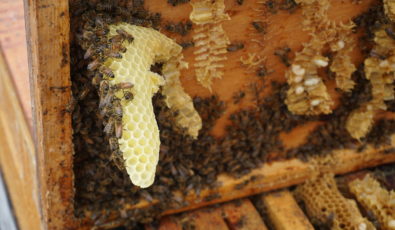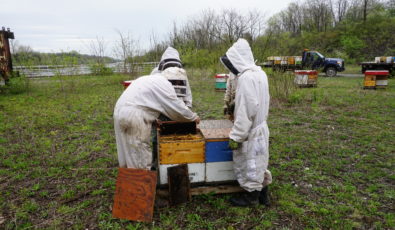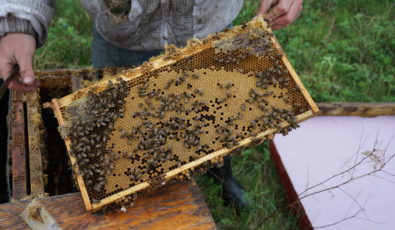OPG’s Niagara Operations home to one of Canada’s largest bee colonies
Believe it or not, OPG’s sites in the Niagara region are home to one of the largest bee colonies in Canada.

Five different locations at OPG’s Niagara Operations now host an impressive 2,400 bee hives, a number that could double by the end of 2019.
Each hive houses 20,000 to 50,000 honey bees, adding up to more than 48 million bees in total. That’s a whole lot of buzzing – and pollinating – going on in Niagara.
“The concentrated pollination done by these bees promotes plant growth, which in turn increases the food source for many other animals, from deer to butterflies. All have more to eat,” said Nancy Laser, an Environmental, Chemical and Safety Technician with OPG's Niagara Operations who oversees the bee program, part of OPG’s site-specific commitment to improve biodiversity and conservation at its operations.
In 2016, OPG signed an apiculture agreement with local company Welland Apiaries to locate hundreds of bee hives at its sites and help grow the Niagara region’s honey bee population, which has followed the overall global decline in pollinators. In recent years, OPG has also focused on supporting Ontario’s wild native bee population through programs that encourage businesses, residents and communities to create bee-friendly gardens and backyards.
“This is the biggest population of bee hives in Ontario to Canada’s east coast. It’s very tropical-like out here, so it’s a beautiful spot to rear our colonies. Our goal is to have as many hives as possible at peak strength and population.”Chris Hamilton, head beekeeper with Welland Apiaries
OPG has since lengthened the agreement at Niagara and expanded to five sites, which include the DeCew I and II hydroelectric generating stations and areas around the Sir Adam Beck Pump Generating Station reservoir. A monitoring program has also started this year to track the improvement in flora and fauna at these sites nurtured by the bees’ presence.

“This is the biggest population of bee hives in Ontario to Canada’s east coast,” said Chris Hamilton, head beekeeper with Welland Apiaries. “It’s very tropical-like out here, so it’s a beautiful spot to rear our colonies. Our goal is to have as many hives as possible at peak strength and population.”
This summer, the hives are so healthy that Hamilton, a seventh generation beekeeper, is already splitting some hives, a process usually done in the fall that turns a single colony into two colonies. Hamilton is also distributing some of the booming hives to other beekeepers in the province to help improve struggling colonies outside of Niagara and promote more pollination across Ontario.
Bees and other insects play a critical role in pollination, both for crops and wild plants. Without them, crops would not be able to reproduce, resulting in limited plant growth and a declining food supply for humans.
The season for pollination starts around March, when the insects have awakened from their winter slumber and are brought to the OPG sites. The honey bees then spread their wings and go to work on the trees and plants in the Niagara region, pollinating fruits like apples and peaches.

In addition to being near a large body of water, OPG’s sites in Niagara have minimal exposure to commercial herbicides and insecticides, making it ideal grounds for the bees. The sites also offer a wide, bountiful area away from human populations for the pollinators to rest and flourish.
“Our biggest challenge has been finding co-operative people and companies like OPG who are willing and trusting us to go to work on their property,” Hamilton said. “It’s very important to find places like these that provide natural forage for the bees.”
Earlier this year, OPG’s Niagara Operations was designated as “Gold Certified” by the Wildlife Habitat Council. The designation recognizes Niagara Operations’ commitment to biodiversity and conservation work at its various sites across the region.
Subscribe and stay informed
Sign up to receive the latest news, project updates, and event information from OPG.